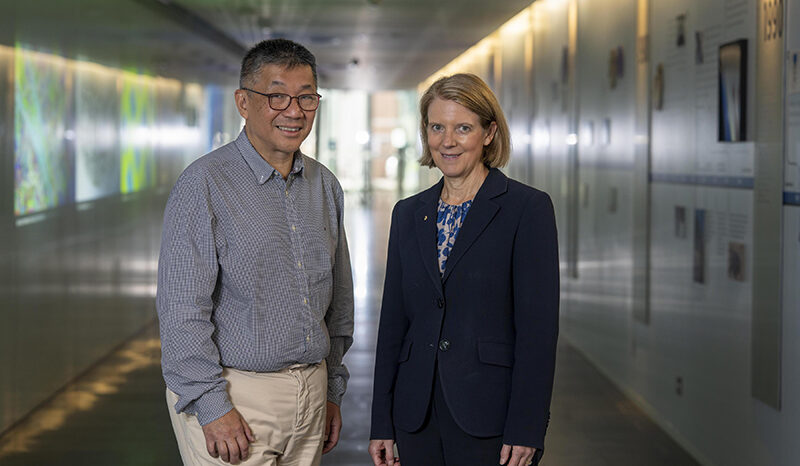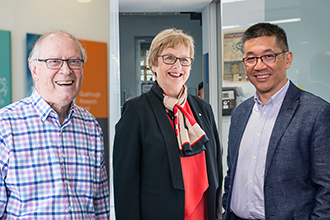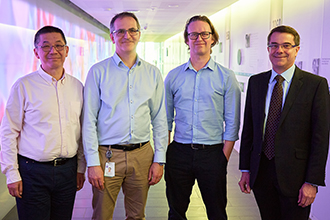Gong J-N, Djajawi TM, Moujalled DM, Pomilio G, Khong T, Zhang L-P, Fedele PL, Low MS, Anderson MA, Riffkin CD, White CA, Lan P, Lessene G, Herold MJ, Strasser A, Spencer A, Grigoriadis G, Wei AH, van Delft MF, Roberts AW, Huang DCS. Re-appraising assays on permeabilized blood cancer cells testing venetoclax or other BH3 mimetic agents selectively targeting pro-survival BCL2 proteins. Cell Death & Differentiation. 2025;32(8):10.1038/s41418-025-01487-7
Xu J, Dong X, Peng Y, Yan J, Xu P, Li F, Zhang S, Chen L, Meng X, Wang K, Xing M, Li W, Huang DCS, Zhao Q, Chen B. ZMYND8 Reads H3K36me2 to Activate CEBPE Transcription and Suppress Multiple Myeloma Progression through the Inhibition of Adaptive UPR Pathways. Advanced Science. 2025;12(20):10.1002/advs.202409219
Peng H, Jabbari JS, Tian L, Wang C, You Y, Chua CC, Anstee NS, Amin N, Wei AH, Davidson N, Roberts AW, Huang D, Ritchie ME, Thijssen R. Single-cell Rapid Capture Hybridization sequencing to reliably detect isoform usage and coding mutations in targeted genes. Genome Research. 2025;35(4):10.1101/gr.279322.124
Li Q, Ci H, Zhao P, Yang D, Zou Y, Chen P, Wu D, Shangguan W, Li W, Meng X, Xing M, Chen Y, Zhang M, Chen B, Kong L, Zen K, Huang DCS, Jiang Z-W, Zhao Q. NONO interacts with nuclear PKM2 and directs histone H3 phosphorylation to promote triple-negative breast cancer metastasis. Journal of Experimental & Clinical Cancer Research. 2025;44(1):10.1186/s13046-025-03343-5
Li K, Yap YQ, Moujalled DM, Sumardy F, Khakham Y, Georgiou A, Jahja M, Lew TE, De Silva M, Luo M-X, Gong J-N, Yuan Z, Birkinshaw RW, Czabotar PE, Lowes K, Huang DCS, Kile BT, Wei AH, Dewson G, van Delft MF, Lessene G. Differential regulation of BAX and BAK apoptotic activity revealed by small molecules. Science Advances. 2025;11(10):10.1126/sciadv.adr8146
Brown FC, Wang X, Birkinshaw R, Chua CC, Morley T, Kasapgil S, Pomilio G, Blombery P, Huang DCS, Czabotar P, Priore SF, Yang G, Carroll M, Wei AH, Perl AE. Acquired BCL2 variants associated with venetoclax resistance in acute myeloid leukemia. Blood Advances. 2025;9(1):10.1182/bloodadvances.2024014446
Luo M-X, Tan T, Trussart M, Poch A, Nguyen TMH, Speed TP, Hicks DG, Bandala-Sanchez E, Peng H, Chappaz S, Slade C, Utzschneider DT, Koldej RM, Ritchie D, Strasser A, Thijssen R, Ritchie ME, Tam CS, Lindeman GJ, Huang DCS, Lew TE, Anderson MA, Roberts AW, Teh CE, Gray DHD. Venetoclax dose escalation rapidly activates a BAFF/BCL-2 survival axis in chronic lymphocytic leukemia. Blood. 2024;144(26):10.1182/blood.2024024341
Gao M, Georgiou A, Lin VS, Jahja M, White CA, Anderson MA, McCormack MP, Roberts AW, Huang DCS, Thijssen R. Potential impact of NOTCH1 activation on venetoclax sensitivity in chronic lymphocytic Leukaemia: In vitro insights and clinical implications. British Journal of Haematology. 2024;205(4):10.1111/bjh.19604
Yuan Z, van Delft MF, Li MX, Sumardy F, Smith BJ, Huang DCS, Lessene G, Khakam Y, Jin R, He S, Smith NA, Birkinshaw RW, Czabotar PE, Dewson G. Key residues in the VDAC2-BAK complex can be targeted to modulate apoptosis. PLOS Biology. 2024;22(5):10.1371/journal.pbio.3002617
Wang Z, Burigotto M, Ghetti S, Vaillant F, Tan T, Capaldo BD, Palmieri M, Hirokawa Y, Tai L, Simpson DS, Chang C, Huang AS, Lieschke E, Diepstraten ST, Kaloni D, Riffkin C, Huang DCS, Suen CSNLW, Garnham AL, Gibbs P, Visvader JE, Sieber OM, Herold MJ, Fava LL, Kelly GL, Strasser A. Loss-of-Function but Not Gain-of-Function Properties of Mutant TP53 Are Critical for the Proliferation, Survival, and Metastasis of a Broad Range of Cancer Cells. Cancer Discovery. 2024;14(2):10.1158/2159-8290.cd-23-0402






